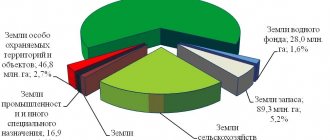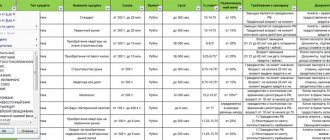General points
The provision of services for the maintenance of residential space depends on the type of development and the organization system chosen by the residents:
- private sector homeowners receive utility services directly from supply companies, according to concluded agreements. Owners have to decide issues of housing maintenance themselves;
- Residents of apartment buildings sign agreements with homeowners associations or management companies. It is possible to organize housing cooperatives. These structures interact with utility organizations - resource suppliers, are responsible for maintaining the house and surrounding area, garbage removal and solving other pressing issues.
Residents of apartment buildings often have doubts about the validity of the invoice received from the management company.
Basic Concepts
Housing and communal services payments are divided into two categories:
- utilities - mandatory services for the supply of energy resources, including water supply with drainage, supply of electricity, gas and heat, solid fuel (for stove heating). Methods for calculating prices for supplied resources are approved at the national level. But the final tariffs are set by regional authorities, taking into account the organization of the local economy;
- housing - expenses for the maintenance of common property, repairs of building structures, solid waste removal, etc. All residents of an apartment building have the right to determine the relevance of these costs and set the amount of payments. The decision is approved at the general meeting, based on information provided by management companies about the nature of the upcoming expenses.
Any residential premises are equipped with the following mandatory equipment:
- shower, bath, sink with working faucet;
- heating system;
- power supply with sockets and switches, other electrical appliances;
- sewerage system.
Objects from the specified list located within the apartment do not relate to public services, but to the means of providing them. The maintenance of this property is the responsibility of the owners.
Who are the obligatory payers?
Housing Code in Art. 153 provides for the need to pay for provided utility services by the following categories of entities:
- for renters of apartments or premises - from the moment of signing the contract;
- tenants or tenants of residential property from municipal or state facilities - from the beginning of the contract;
- members of housing cooperative communities - after receiving living space;
- homeowners - from obtaining the right to own the premises.
The legislation obliges citizens registered for housing to pay for housing and communal services. In fact, persons living in an apartment can pay for utilities voluntarily, after concluding an agreement with the owner.
If payers did not live in the premises, they are exempt from the obligation to pay for services that they did not consume. But this requires proper registration. When a citizen submits an application to the management company, providing documentary evidence of absence from the apartment, the utility fee is recalculated in the prescribed manner.
But the inclusion of expenses for maintaining common property in the payment is not canceled. The resulting debt is a serious obstacle when you intend to sell your living space. Failure to pay threatens the owner with claims filed in court by utility organizations. As a result, you will have to forcibly repay debts, along with accrued penalties.
Legislative norms
Issues of legislative regulation of payment for housing and communal services are regulated by the following regulations:
- Civil Code of the Russian Federation.
- Federal Law No. 261-FZ, signed in November 2009 and regulating energy saving issues.
- Law of the Russian Federation No. 2300-1, adopted in February 1992 and defining consumer rights.
- Housing Code of the Russian Federation.
- The concept of price and tariff policy in the housing and communal services of the Russian Federation.
- Government Decree No. 354 of 05/06/2011, approving the rules for the provision of housing and communal services to the population.
- Rules for the use of public water supply and sewerage systems in the Russian Federation.
- The main directions and mechanisms of energy and resource conservation in the housing and communal services of the Russian Federation.
Additionally, these issues are regulated by local government regulations.
New standards
In 2013, changes were approved regarding the rules for the provision of corporate governance. What is included in the concept of “utility fees”? How is it calculated under the new rules? Payment for utilities (except for heating) is divided into personal and general house and is signed separately on the receipt.
The innovations also affected standard coefficients. They should “encourage” the population of apartment buildings to install individual meters. For those who have the technical ability to supply devices that keep house-wide and individual records, but have not done so, increased standards have been introduced for all types of utilities. For example, after the new year, payment increased by 10%, six months later - by another 10%, and so on until the excess reaches 60%! As a result, those who do not install meters will have to pay in two years 60% more than those who did.
The advantage in this situation is that this overpayment for the utilities should be spent by the management organization on energy saving and increasing the efficiency of power systems. A question arises regarding the president’s demand not to allow the cost of corporate capital to increase above 6% per year. How will this instruction be implemented for those living in apartments and houses without meters?
What does the list of housing and communal services for citizens include?
Payment for housing and communal services is calculated in two ways:
- according to the readings of individual metering devices;
- according to consumption standards, calculated according to approved methods, depending on the quantity prescribed for the living space.
Installed individual metering devices must be sealed before being put into operation. It is the responsibility of consumers to regularly provide information about meter readings to the management or utility company. The owner is responsible for the integrity of the seals and timely verification of meters.
If the device malfunctions or the meter verification is overdue, payment is made according to approved standards. Next - more details about the provision of various housing and communal services.
Electricity
Electricity supplied to apartments is paid according to the readings of installed meters. Consumers are forced to pay for the energy spent on servicing common areas - lighting of staircases, entrances, attics and basements, and the operation of elevators.
Unlike utility costs for electricity supplied to apartments, general house payments are calculated according to accepted standards, divided by the number of registered residents.
Legislation limits the maximum duration of interruptions in the supply of resources:
- two hours monthly if the facility is powered from two independent sources;
- days for the specified period, if the source is the only one.
The supplier is obliged to provide electricity with the established parameters, without voltage drops.
Hot and cold water supply
With cold water supply, the consumer is provided with water purified from harmful elements and pathogens.
Interruptions are allowed for a month, with a total duration of no more than:
- eight hours - in ordinary cases;
- twenty-four - in case of a large-scale accident.
For a hot water supply system, the requirements for the duration of interruptions are similar. Additional conditions require compliance with the temperature regime:
- when the water temperature is below plus forty degrees, the consumer can pay for services at cold water supply tariffs;
- Heating above seventy-five degrees is not allowed.
In the absence of common house communication systems, access to a public water stand must be provided.
Heating
Heating must ensure that the air temperature in the room is maintained at least eighteen degrees above zero. During the month, the total duration of interruptions in heat supply should not exceed twenty-four hours.
The following restrictions have been established for one-time interruptions in heat supply:
- at a room temperature above twelve degrees - no more than sixteen hours;
- within the range of ten to twelve degrees - up to eight hours;
- from eight to ten - within four hours.
The size of the payment is affected by the total area of the heated room. Tariff plans are approved by regional regulations.
Water disposal
Houses must be equipped with sewer lines that ensure the removal of consumed water. The drainage system is carried out to ensure proper environmental standards. The sanitary and epidemiological situation in the region largely depends on the condition of sewage drains.
The tariff is set by a resolution of local authorities, but is calculated on the basis of approved national methods. The amount of payment depends on the total volume of cold and hot water consumed.
Solid Waste Disposal
Garbage removal is included in housing payments. Payments for solid waste disposal are calculated according to the area of the apartment. But this situation raises a lot of questions among the population.
Most residents believe that it is more appropriate to determine expenses depending on the number of registered people in the apartment. With this accrual procedure, a methodology similar to the accrual of utility bills will be used.
ODPU fee
ODPU is a common house metering device. These funds are used to determine the amount of payments for energy resources spent on common property:
- the amount of resources on individual meters in apartments is subtracted from the ODPU readings;
- the resulting difference is divided equally between registered residents.
As a result, the management company gets the opportunity to pay suppliers for energy resources additionally spent on maintaining the common household facilities.
Additional services
In addition to the mandatory communal services, the management company or other organizations may offer additional services:
- cable television or internet;
- radio;
- intercom;
- paid parking, etc.
The owner of the living space has the right to choose whether or not to use the specified amenities.
What information is contained in receipts?
To pay for housing and communal services, each owner or tenant of housing receives special receipts from the management company. They contain all information about consumed resources. It states by what date the receipt must be paid.
The receipt must contain the following information:
- rates;
- correctly calculated payments;
- total amount to be paid.
Based on the available information, each person can recalculate to ensure that the information available in the document is correct. Typically, the data is contained in a table, which makes the document easier to study.
What additional information may be available?
Often additional information is included in the receipt. These include:
- current account number;
- the period for which the document was compiled;
- details of all enterprises supplying resources;
- information about the apartment or house;
- meters data;
- calculation of general house needs;
- information about benefits or other concessions that payers can use.
This video will tell you how to read a rent receipt:
Almost all receipts are equipped with a special barcode, which simplifies the payment process.
Some nuances
Let's consider the features of payment for utilities by tenants of premises and organizations.
When paying rent
The rental of premises is formalized by an appropriate agreement between the owner of the living space and the tenant. The terms of payment for utility services are stipulated in the specified agreement.
The following options for the relationship between the parties are provided:
- fiduciary - the owner pays utility bills using funds received from the tenant;
- self-payment - settlements with utility organizations are transferred under the responsibility of the tenant, in accordance with actual meter readings.
Sometimes the provisions of the contract do not determine the payment procedure. But legislative norms provide that the payer of utilities, if there is a lease agreement, must be the entity renting the premises. In this case, the owner is obliged to monitor the timely payment of bills.
What should a legal entity pay for?
Legal entities, along with individuals, are required to pay for consumed resources. Payment is made in accordance with concluded agreements with management or utility companies according to the readings of individual metering devices. Legal entities pay for services in the same way as an ordinary consumer, including costs for servicing residential and non-residential buildings.
But if the resources are used for production activities, the company's relationship with the service provider is governed by a separate agreement that determines the payment procedure.
Payment principles
Payment for utilities is carried out monthly. As a rule, payment for the previous month must be made by the 10th of the current month. Other terms may be established by a management agreement or a decision of a meeting of owners of a residential complex (cooperative).
In order to make the payment correctly, the payer needs the following information:
- amount of resource consumed
- amount of debt
- tariff for a particular resource
Payment is made according to the payment documents received by the payer. It is necessary to keep documents confirming the fact of payment. Utility tariffs are the cost of a unit of resource provided.
They look like this:
- for heat – rub./1 Gcal
- for water (hot, cold) – rub./1 cubic meter.
- electricity – rub./1 kWh.
Tariffs for housing and communal services
Tariffing can also be carried out according to standards per person. Each utility service has its own monthly rate per resident. Paying by meter is often cheaper. Especially in cases of prolonged absence of the owner of the home, when resources are not consumed.
Is it possible to refuse certain types of services?
Additional services, in the form of intercom equipment, Internet connection or cable television, do not apply to housing and communal services. The consumer has the right to refuse this type of service if he does not feel the need for it. Residents cannot be forced to use or pay for these services.
If the management company includes payment for an intercom or other service in the consumer’s bill, the homeowner can write a refusal statement. In the future, this amount is excluded from the housing and communal services account items.
But all residents are required to pay the costs of maintaining common property - an elevator, a garbage chute, building repairs. Residents of the house enjoy the benefits provided, so refusal to pay for these services is unlawful.
Six ways to reduce your rent
How to find out what is included in public services and where to go to protect your rights? With a few steps you can reduce utility costs and influence utility companies:
- Formally requesting your rates by line item will help you see what your utilities include, what you have to pay for, and what services you're not receiving in full.
- To draw up an act for services not provided within a month, you need to invite an employee of the housing cooperative of your management company to visit you. The act must be prepared by the 20th of the current month.
- Together with a housing cooperative employee (or without him), draw up a claim act. Collect signatures from residents (the more, the better).
- In the first days of the month, submit an application to the housing cooperative for recalculation of payment for the utility bill; the acts must be attached.
- If utility companies refuse to recalculate, file a complaint with the consumer protection department of the region, region, or the city housing and communal services department.
- In addition, the consumer has the right to refuse such services as cleaning staircases.





